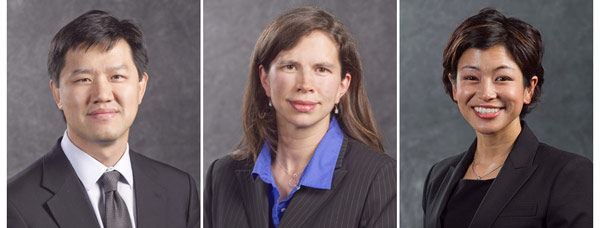
Alex Wang, Andrea Roth and Karen Tani
By Andrew Cohen
While they hail from varied backgrounds both geographically and professionally, new faculty members Alex Wang, Andrea Roth, and Karen Tani shared a common incentive for choosing Berkeley Law: the engaged students.
Tani, who focuses on U.S. legal history and welfare law, made recruiting trips to several law schools. “Berkeley’s students really stood out to me as being invested in the school,” she said. “They were excited about my work, and, as a young woman of color, it was great to see so many students felt they could benefit from my mentorship.”
A teaching fellow at Stanford Law School for three years, Roth said she “could not think of another top-tier school where the students have such a clear commitment to social justice regardless of the career they’re pursuing. That’s incredibly rewarding as an educator, and it was critical to my choice in deciding where to teach.” Wang, an expert on law in China and environmental law, said that “their level of commitment and engagement is striking.”
Berkeley Law’s faculty was another big draw for Roth, a former public defender and an expert on criminal procedure and evidence. “They’re passionate, energetic, and risk-taking,” said Roth, who graduated from Yale Law School and won a prize for best presentation in its mock trial competition. “I was also impressed at the size of the junior faculty, which is larger than any other top-tier school. It creates a wonderful community of people thinking in original ways about cutting-edge issues.”
During her eight years as a trial and appellate attorney at the Public Defender Service for the District of Columbia, Roth was a founding member of a forensic practice group that studied and litigated forensic DNA typing. She has lectured nationally on forensic science issues, and is currently examining how longstanding concepts of criminal procedure and evidence law must be reexamined in an era of science-based prosecutions.
Roth sees a rising tension between the original humanistic justifications for criminal law’s reasonable doubt standard and today’s push to resolve trials through exceptionally high DNA match statistics and other seemingly hyper-reliable evidence.
“If historians are right that the jury’s role as lie detector did not evolve from the view that jurors are particularly good at determining credibility, then should we instruct them not to contradict highly reliable scientific evidence of credibility such as neuroimaging results?” she asked. “The more reliable such technologies become, the more we will be forced to articulate the continued justifications for our traditional systems of proof.
Tani’s research explores the legal architecture of the U.S. welfare state and the legal practices of its designers, administrators, critics, and beneficiaries. The first graduate of the University of Pennsylvania’s J.D./Ph.D. program in American Legal History, she taught Employment Discrimination and Social Welfare Law at Penn Law School.
After more than dozen years on the East Coast, Tani says she moved west to join a group of senior legal historians she “respects immensely.” She will fill a junior legal historian void at Berkeley Law and work closely with the Center for the Study of Law and Society. Tani’s current research examines legal battles over welfare benefits and administration from the New Deal through the welfare rights movement in the 1960s.
“I try to be aware of different learning styles and not rely too heavily on one mode of conveying information,” she said. “As a historian, I’m also interested in explaining how our laws evolved, and what problems they originally tried to address. For students, it makes the black-letter law more intuitive.”
Wang’s research and teaching focuses on environmental law, Chinese law, and comparative law. As a senior attorney for the Natural Resources Defense Council, he helped establish its Beijing office in 2006 and directed its China Environmental Law & Governance Project for nearly six years. In doing so, he worked with government agencies, the legal community, and advocacy groups to improve China’s environmental laws and strengthen its citizens’ role in environmental protection.
Wang hopes to bring his personal experiences on the ground to personalize abstract issues and make them accessible to students. Grappling with the seeming contradiction of China’s worsening environmental crisis with its concurrent green-tech movement, he believes the country is at a crossroads.
“China is attempting to implement the largest climate greenhouse gas and pollution reduction plan in the world,” said Wang, whose commentaries have appeared in major outlets such as New York Times, Wall Street Journal, China Daily, and Time Magazine. “But the plan has daunting challenges and whether it will ultimately work remains unknown. It’s rewarding to work on ways to improve that system. Given the law school’s strong focus on both the environment and China, this is an ideal place for me to do that.”